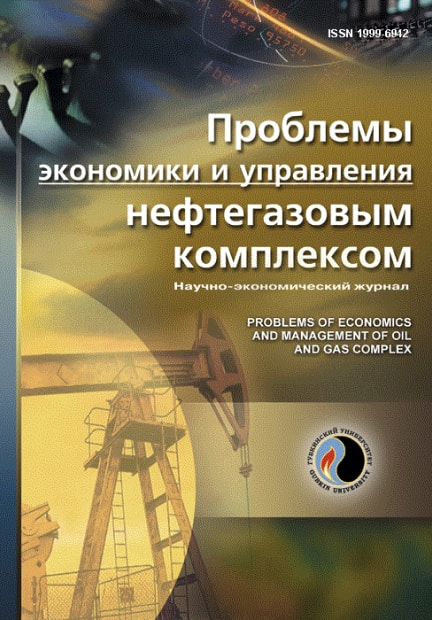Decommissioning of oil and gas facilities: models of sustainable development and circular economy
UDC: 339.976.2
DOI: 10.33285/1999-6942-2023-3(219)-30-36
Authors:
KHALIDOV IBRAGIM A. 1
1
1 National University of Oil and Gas "Gubkin University", Moscow, Russia
Keywords: decommissioning, oil and gas facilities, marine platforms, sustainable development models, circular economy models
Annotation:
Today, fundamental structural changes in the energy sector are taking place all over the world due to the transition to renewable energy sources and models of sustainable development of the economy and energy policy. The process directly affects even such an important segment in the hydrocarbon supply chain as the decommissioning of oil and gas facilities (DECOM). It is from the point of view of the concepts of the sustainable development model and decarbonization, as well as the circular economy model (a circular economy closely related to the problem of introducing more low-carbon energy systems), that the key points of this energy transition are outlined, one of which is DECOM.
Bibliography:
1. Rynok konservatsii i vyvoda mestorozhdeniy iz ekspluatatsii. – Boston Consulting Group, 2017. – URL: http://oilandgasforum.ru/data/files/rosgeol/Gayda.pptx (data obrashcheniya 13.03.2019).
2. Oudenot E., Whittaker P., Vasquez M. Preparing for the next wave of offshore decommissioning. – Boston Consulting Group, 2018. – URL: https://web-assets.bcg.com/img-src/BCG-Preparing-for-the-Next-Wave-of-Offshore-Decommissioning-Apr-2018-NL_tcm9-188833.pdf
3. Whittaker P., Oudenot E., Vasquez M. A roadmap for cutting decommissioning costs by 30%. – Boston Consulting Group, 2018. – URL: https://web-assets.bcg.com/img-src/BCG-A-Roadmap-for-Cutting-Decommissioning-Costs-by-30-percent-Oct-2018-NL_tcm9-205316.pdf
4. Product design and business model strategies for a circular economy / N.M.P. Bocken, I. de Pauw., C. Bakker, B. van der Grinten // J. of Industrial and Production Engineering. – 2016. – Vol. 33, Issue 5. – P. 308–320. – DOI: 10.1080/21681015.2016.1172124
5. Chesbrough H. Business Model Innovation: Opportunities and Barriers // Long Range Planning. – 2010. – Vol. 43, Issue 2-3. – P. 354–363. – DOI: 10.1016/j.lrp.2009.07.010
6. The Circular Economy – A new sustainability paradigm? / M. Geissdoerfer, P. Savaget, N.M.P. Bocken, E.J. Hultink // J. of Cleaner Production. – 2017. – Vol. 143. – P. 757–768. – DOI: 10.1016/j.jclepro.2016.12.048
7. Guldmann E., Bocken N.M.P., Brezet H. A design thinking framework for circular business model innovation // J. of Business Models. – 2019. – Vol. 7, No. 1 (Special Issue: Sustainable Value Creation through Business Models). – P. 39–70. – DOI: 10.5278/ojs.jbm.v7i1.2122
8. Guldmann E., Huulgaard R.D. Barriers to circular business model innovation: A multiple-case study // J. of Cleaner Production. – 2020. – Vol. 243. – P. 181160. – DOI: 10.1016/j.jclepro.2019.118160
9. Jabłonski M. Value migration to the sustainable business models of digital economy companies on the capital market // Sustainability. – 2018. – Vol. 10, Issue 9. – P. 3113. – DOI: 10.3390/su10093113
10. Nielsen K.R. Handbook of Sustainable Innovation by Frank Boons & Andrew McMeekin // J. of Consumer Policy. – 2020. – Vol. 43, Issue 2. – P. 419–421. – DOI: 10.1007/s10603-019-09445-w
11. Zott C., Amit R.H., Massa L. The Business Model: Recent Developments and Future Research // J. of Management. – 2011. – Vol. 37, Issue 4. – P. 1019–1042. – DOI: 10.2139/ssrn.1674384
12. Kraynova E.A., Rokhlin S.M. Ekonomicheskiy mekhanizm realizatsii korporativnykh kvot snizheniya dobychi nefti v usloviyakh sdelki OPEK+ // Problemy ekonomiki i upravleniya neftegazovym kompleksom. – 2021. – № 9(201). – S. 23–30. – DOI: 10.33285/1999-6942-2021-9(201)-23-30

